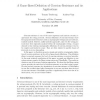Free Online Productivity Tools
i2Speak
i2Symbol
i2OCR
iTex2Img
iWeb2Print
iWeb2Shot
i2Type
iPdf2Split
iPdf2Merge
i2Bopomofo
i2Arabic
i2Style
i2Image
i2PDF
iLatex2Rtf
Sci2ools
CSFW
2010
IEEE
2010
IEEE
A Game-Based Definition of Coercion-Resistance and Its Applications
Coercion-resistance is one of the most important and intricate security requirements for voting protocols. Several definitions of coercion-resistance have posed in the literature, both in cryptographic settings and more abstract, symbolic models. However, unlike symbolic approaches, only very few voting protocols have been rigorously analyzed within the cryptographic setting. A major obstacle is that existing cryptographic definitions of coercion-resistance tend to be complex and limited in scope: They are often tailored to specific classes of protocols or are too demanding. In this paper, we therefore present a simple and intuitive cryptographic definition of coercion-resistance, in the style of game-based definitions. This definition allows to precisely measure the level of coercion-resistance a protocol provides. As the main technical contribution of this paper, we apply our definition to two voting systems, namely, the Bingo voting system and ThreeBallot. The results we obtain are...
| Added | 02 Sep 2010 |
| Updated | 02 Sep 2010 |
| Type | Conference |
| Year | 2010 |
| Where | CSFW |
| Authors | Ralf Küsters, Tomasz Truderung, Andreas Vogt |
Comments (0)

